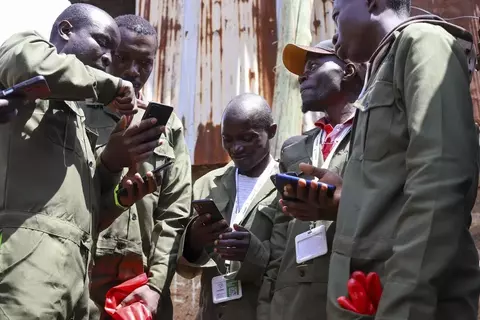 Roughly 200 people in Soweto West now use the cryptocurrency as part of an initiative to bring financial tools to one of Kenya’s poorest and most underbanked areas. The program is spearheaded by AfriBit Africa, a local fintech company aiming to expand access to digital finance.
Roughly 200 people in Soweto West now use the cryptocurrency as part of an initiative to bring financial tools to one of Kenya’s poorest and most underbanked areas. The program is spearheaded by AfriBit Africa, a local fintech company aiming to expand access to digital finance.
“In many cases, people in Kibera do not have the opportunity to secure their lives with traditional savings,” said Ronnie Mdawida, co-founder of AfriBit Africa. “With bitcoin, they don’t need documentation to open a bank account, which lays the foundation for financial freedom.”
Bitcoin, launched in 2009 after the global financial crisis, was designed as a decentralized digital currency. While often used as a speculative asset, its core supporters believe it can offer financial inclusion. But critics warn of risks, especially for low-income users.
AfriBit Africa introduced bitcoin to Soweto West in early 2022, distributing crypto-denominated grants to youth-led garbage collection groups funded by nonprofits. Each Sunday, after community cleanups, workers are paid a few dollars’ worth of bitcoin. Mdawida says young people have shown the greatest interest in using the technology.
To date, the initiative has channeled about $10,000 in bitcoin into the local economy, with waste collectors becoming the primary advocates for crypto adoption. In Kibera, where many residents earn around $1 a day, some now hold bitcoin, and select merchants and motorcycle taxi drivers accept it as payment.
Damiano Magak, 23, who collects trash and sells food, said he prefers bitcoin over Kenya’s ubiquitous mobile money service M-PESA, citing lower fees and faster transactions. While M-PESA charges fees beyond 100 Kenyan shillings (about $0.78), AfriBit’s promoted bitcoin wallet, based on the Lightning Network, offers free transfers within the community.
Another collector, Onesmus Many, 30, said bitcoin feels safer than cash, especially in an area where theft is common.
Vegetable seller Dotea Anyim estimates that about 10 percent of her customers pay in bitcoin. “It’s cheap and fast with no transaction fees,” she said, adding that she saves her bitcoin and uses cash for restocking.
Despite the enthusiasm, experts are concerned about the exposure. Magak and Many say 70 percent to 80 percent of their net worth is now in bitcoin.
“That’s dangerous,” said fintech entrepreneur Ali Hussein Kassim. “For someone in Kibera, losing 80 percent of their wealth is catastrophic.”
Kassim recognizes the broader potential of digital assets, particularly for remittances, but says volatile crypto markets and lack of regulation pose significant risks to vulnerable populations.
Mdawida disagrees, arguing that bitcoin’s independence from banks is a strength. AfriBit Africa provides crypto education and financial literacy courses to address risks.
Bitcoin adoption in developing countries has faced obstacles. El Salvador and Central African Republic made bitcoin legal tender but have since scaled back. Kenya has taken a cautious approach, occasionally cracking down on crypto giveaways, though the Soweto West project continues.
When bitcoin goes up, I get notifications,” Magak said. “Whenever it dips, I just remind myself, it will rise again.

